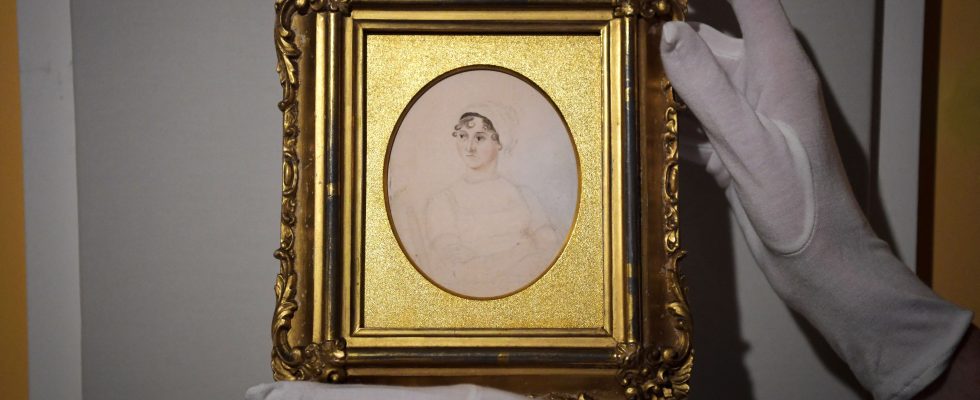Even barbie winks at him. In Greta Gerwig’s blockbuster, Mattei’s depressed doll watches over and over Pride and Prejudice, Colin Firth version of course. More than two hundred years after her death, Jane Austen (1775-1817) is a pop superstar: the most cited deceased author on TikTok with more than 600 million hashtags, incessant audiovisual adaptations, parodies like Pride and Prejudice and Zombies… Since the dark Colin Firth played Mr. Darcy in the cult BBC mini-series in 1995, “Austenmania” has been all the rage on the screens, boosted by the vogue for historical romances and the craze for female characters strong.
In the United Kingdom, the one that adorns 10 pound notes is Shakespeare’s only rival. But, as a fascinating collective work reminds us, Austen Powers, this English pride is still too often the victim of prejudice in France. If, in the language of Molière, sales are very good, they are concentrated on the two flagship novels, Pride and Prejudice (more than 450,000 copies for fifteen years according to Edistat) and Reason and feelings (more than 150,000), to the detriment of other gems like Persuasion Or Mansfield Park. Above all, unlike the Brontë sisters, the clichés surrounding the Hampshire writer are hard-boiled: “blue flower” romances, ball scenes in Bath in Regency dresses, dated moralism… This forgets the primordial place of Jane Austen, pioneer in free indirect discourse, in the development of the modern novel as a medium par excellence for revealing the depths of the human soul. In Northanger Abbeyher first novel (published after her death), Jane Austen delivers a manifesto for the genre, then generally popular with women and therefore considered a minor literary form: “A novel is quite simply a work in which the most great powers of the mind are displayed, in which the deepest knowledge of human nature, the happiest delineation of its varieties, the liveliest effusions of wit and humor, are transmitted to the world in language the best chosen.
Unfortunately, the French reader has often been deprived of the humor, irony, and finesse that characterize Jane Austen’s prose in the original version. The misunderstanding goes back to the origins. One of the first translators was Isabelle de Montolieu, a successful author of sentimental novels. The latter, knowing little English, shows real adaptations, a very widespread practice at the time. As Marie-Alix Hediard, a classics teacher, points out, the work was immediately diverted towards rosewater, with a very moralizing style: “All the irony and the biting and realistic criticism of the morals of the “era are thus erased in favor of a loving pedagogy intended for young girls from good families”.
A “comic genius”
Conversely, the most recent translation by academic Pierre Goubert for La Pléiade sought to highlight the seriousness of the work. “It was undoubtedly an excessive counterbalance, wanting to place Jane Austen in a moralist and realistic tradition. We thus have something very serious, bombastic, but which loses the omnipresent humor in her writings”, judges Phalene de La Valette, collection director at Baribal who orchestrated Austen Power. “The proof of the failure of French translations is that the general public does not associate Jane Austen with anything funny.” As David Cecil, a great specialist in English literature and author in 1978 of a Portrait of Jane Austenthis discreet pastor’s daughter was above all a “comic genius”: “man is such a strange animal, such a concentration of madness, aberrations and incongruities, that it is impossible for a perceptive observer to understand him. contemplate without smiling. In any case, Jane Austen could not.”
Baribal Editions are also publishing a new, sparkling translation ofEmma signed by the writer Clémentine Beauvais. Rich, happy and only a little idle, Emma, who inspired the teenage rom-com Clueless, stands out from other Austenian heroines. For her, marriage is not the only way to escape social downgrading. “In France, Emma is the most unknown of its female characters, even though she is a very feminist figure. She is the only one of her heroines who does not want to get married. She is very independent, and has nothing to do with it. to make the opinion of others. She has an annoying side, because she does not correspond to the canon of the romantic heroine”, notes Phalene de La Valette. Remember that the eternally single Jane Austen herself broke off her engagement with a wealthy man.
In Emma, the heroine strives to play matchmaker in those around her, even if it means causing disasters. Hilarious, some of the characters already announce those of Charles Dickens. The dialogues hit the mark, such as Emma’s famous line: “Obviously: for a man, it’s always incomprehensible that a woman refuses to marry him. A man imagines that a woman is ready to take whoever wants her.” If, as in all Jane Austen novels, we know the (happy) ending, the outcome here is particularly intense when Emma realizes the true nature of her feelings. As literary critic Mathilde Brézet explains in Austen Powerthis loving confession undoubtedly represents a peak: “Even though we saw the idyll coming, when the scene is delivered to us, suddenly something beats, something is afraid, something is swallowed up in a dizziness, in an exaltation, and we ask ourselves: is it possible to write that?”
Austen Power, collective. Baribal, 117 p., €9.50.
Emma, by Jane Austen, translated from English by Clémentine Beauvais. Baribal, 617 p., €25.
.
